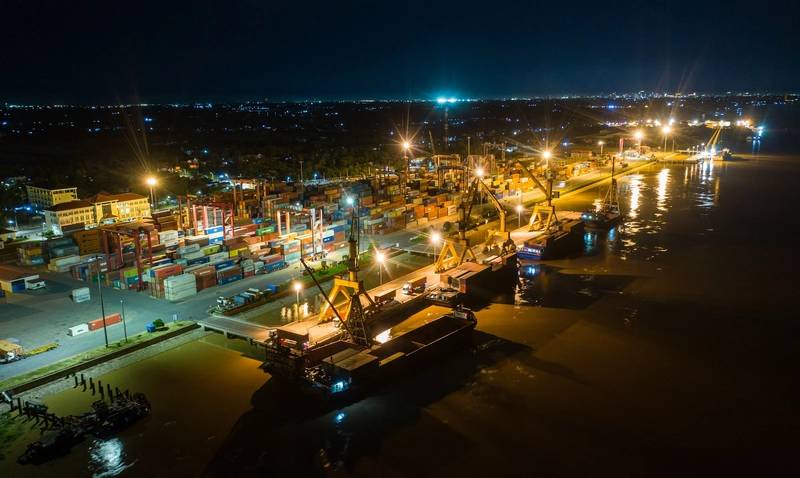Cambodia to Cut Shipping Through Vietnam by 70% With New China-funded Canal
Cambodia plans to cut shipping through Vietnamese ports by 70% as a result of a $1.7 billion China-funded upgrade of a canal connecting the Mekong River basin to the Cambodian coast, the country's deputy prime minister told Reuters.
Sun Chanthol downplayed environmental concerns about the Funan Techo canal slated to break ground later this year, and dismissed speculation that it could be used to allow upriver access for Chinese warships as "baseless".

The project, to be completed by 2028, has the potential to reignite tensions between Cambodia and Vietnam, which are close partners but have often clashed.
Conservationists and Vietnamese authorities have voiced alarm at potential damage to the already fragile Mekong Delta, a massive rice-producing region supporting millions of people downstream in Vietnam.
However, while Sun Chanthol said the canal would be used also for land irrigation and fishing, he said the water that would be diverted would be "a drop in the bucket".
He said the canal's shorter route to the sea for barges and ships from and to Phnom Penh carrying textile and raw material would reduce greenhouse gas emissions.
Cambodia had notified the Mekong River Commission (MRC), an intergovernmental organization for the joint management of the basin, but would not consult other countries in the region about the project, he said.
If requested, Cambodia would provide additional information with the MRC, but had no legal obligation to do so, he said.
The MRC told Reuters that Cambodia had not shared the canal's feasibility study despite multiple requests and two formal letters sent in August and October.
A spokeswoman for Vietnam's foreign affairs ministry said in a statement that she hoped Cambodia would share information and coordinate with Hanoi to assess the impact of the project.
Risks for rice output?
Currently, about 33% of cargo to and from Cambodia use Vietnamese ports for their global trade by sending them through the Mekong River, Sun Chanthol said, noting that with the expanded canal the goal is to reduce that to 10% - which would represent a 70% drop on current shipping volumes.
However, the limited capacity of the canal "brings its economic viability into question," said Ted Osius, former U.S. ambassador to Vietnam and currently head of the US-ASEAN Business Council, an influential advocacy group.
The upgraded 180 km (11 miles) canal would be 100 meters (328 feet) wide with a depth up to 5.4 meters (18 feet), allowing barges and ships with a 3,000 deadweight tonnage to use it, Sun Chanthol said.
"This project has a minimal impact on the environment," he also said, noting it would discharge up to 5 cubic meters (m3) of water per second, versus Mekong's 8,000 m3 per second. "The canal is the size of a straw," he stressed.
Concerns remain, however, especially in Vietnam.
"This project can lead to the displacement of established populations, loss of agricultural lands and reduction of wetlands," said Nguyen Hung, a specialist in supply chains at RMIT University Vietnam, echoing concerns raised by Vietnam National Mekong Committee.
Brian Eyler, programme director on sustainability at U.S.-based think tank Stimson Center, said the canal would "reduce water available for industrial scale rice production in Vietnam".
Eyler said the project requires consultation with other partners under Mekong River Commission rules because the Bassac river, from which water will be diverted, is a branch of the Mekong and not a tributary.
But for Sun Chanthol the project concerns only tributaries of the Mekong, including the Bassac, and therefore does not require consultation with partners.
The canal "will benefit the 1.6 million Cambodians living along the canal" thanks to better irrigation for farming, Sun Chanthol said, adding that impact on the Mekong basin's water resources would be monitored.
China
China Road and Bridge Corporation, a major Chinese state-owned construction company, will develop the canal and fully cover its costs under an agreement with the government of Cambodia, Sun Chanthol said, noting the company in exchange will obtain a multi-decade concession.
"Is it 30 years, is it 40 years, is it 50 years, that will be discussed during our negotiation," he said.
CRBC did not respond to a request for comment.
Sun Chanthol said speculation that the canal could be used by China for military purposes was "absolutely untrue".
"Our constitution does not permit any foreign military in the country," he said.
A Vietnam-based Western diplomat also dismissed as "somewhat exaggerated" warnings from Vietnamese academics about security risks for Vietnam, because of the limited depth of the canal and the size of the locks.
(Reuters - Reporting by Chantha Lach and Francesco Guarascio; additional reporting by Phuong Nguyen; Editing by Michael Perry)
